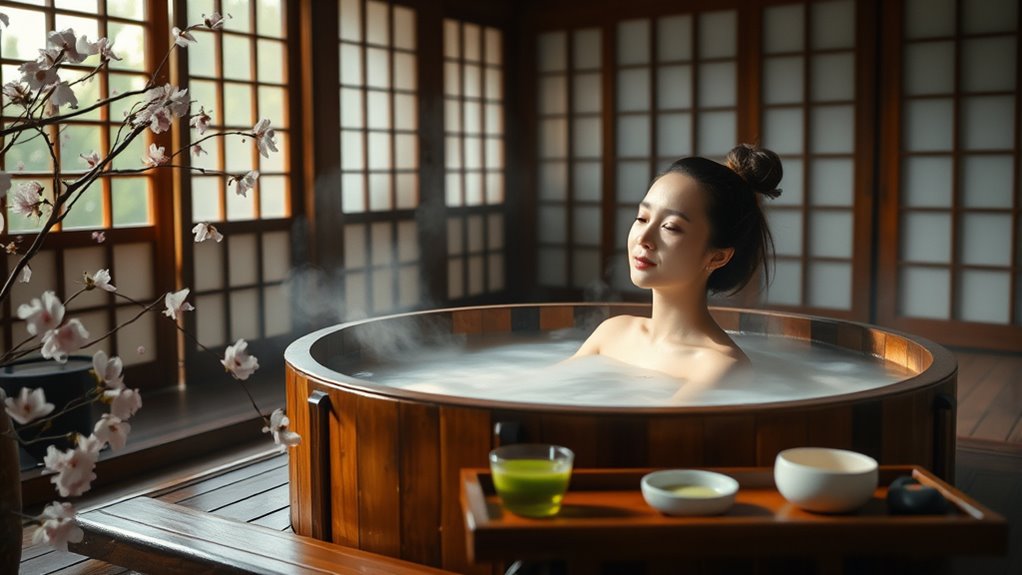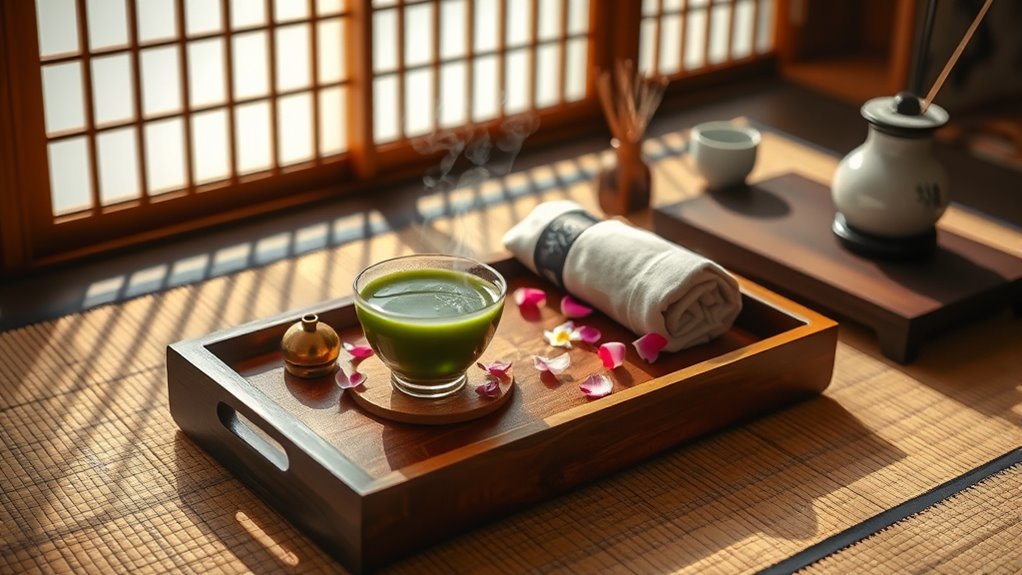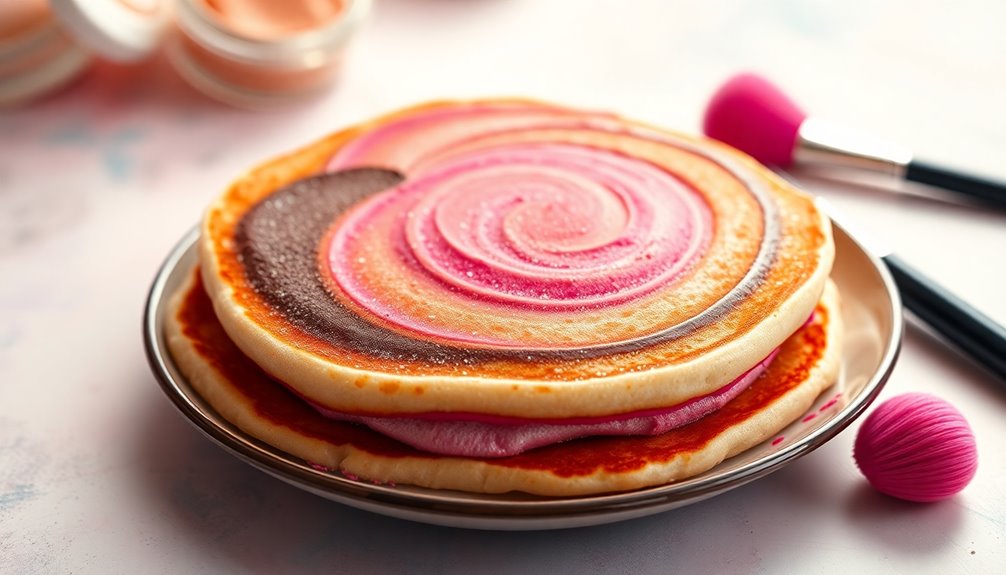Explore self-care rituals from around the world to boost your well-being. Try mindfulness and breath-focused meditation practices like Zen from Japan to clear your mind and reduce stress. Incorporate herbal remedies such as turmeric or Ashwagandha to support mood and immunity. Enhance your sleep with quality mattress toppers for better rest. Embracing these diverse routines can create a balanced, calming routine—keep exploring to discover how these traditions can fit into your daily life.
Key Takeaways
- Practice mindfulness with meditation techniques like Zen in Japan to reduce stress and improve mental clarity.
- Incorporate herbal remedies such as turmeric and Ashwagandha into daily routines for mood and immunity benefits.
- Use herbal oils and teas from cultures like Ayurveda to relax muscles and promote holistic wellness.
- Enhance sleep quality with supportive mattress toppers, aiding overall mental and physical health.
- Combine diverse rituals for a comprehensive self-care routine, fostering relaxation, rejuvenation, and inner peace.

Around the world, cultures have developed unique self-care rituals that promote relaxation, rejuvenation, and mental well-being. These traditions often blend ancient wisdom with natural remedies, offering you diverse ways to nurture your body and mind. One powerful method you might want to incorporate is meditation practices. In Japan, for example, Zen meditation emphasizes mindfulness and focused breathing, helping you clear your mind and reduce stress. Practicing meditation regularly can sharpen your focus, lower anxiety, and foster a sense of inner peace. It’s simple to start—find a quiet space, sit comfortably, and focus on your breath or a calming mantra. Over time, meditation becomes an accessible tool to manage daily pressures and cultivate mental clarity.
Alongside meditation, herbal remedies form a cornerstone of many self-care routines across cultures. In India, Ayurveda employs herbs like turmeric, Ashwagandha, and Brahmi to balance your body and mind. These natural ingredients are believed to improve mood, boost immunity, and promote overall wellness. You can incorporate herbal remedies into your routine through teas, tinctures, or topical applications. For example, sipping turmeric-infused tea once a day can help reduce inflammation and elevate your mood, while applying herbal oils can relax tense muscles and calm your nerves. The beauty of herbal remedies is their accessibility—they’re often easy to prepare or find at local markets, making it simple to integrate them into your daily life. Additionally, incorporating top mattress toppers can enhance your sleep quality, further supporting your overall well-being.
Frequently Asked Questions
How Do Cultural Differences Influence Self-Care Practices Globally?
Cultural differences shape how you approach self-care, influencing your routines and beliefs. You might find that cultural expression plays a key role, with traditions reflecting unique values and practices. Ritual significance varies; some cultures emphasize communal activities, while others focus on individual reflection. These differences help you understand diverse perspectives on well-being, encouraging you to explore new self-care rituals that resonate with your cultural background or broaden your horizons.
Are These Rituals Suitable for All Skin and Body Types?
Think of self-care rituals as keys to revealing your unique glow. Not all rituals suit every skin compatibility or body type, so you should tailor them to your needs. Some practices may work beautifully for you, while others might cause irritation or discomfort. Always listen to your body, adapt techniques accordingly, and consult professionals if needed, ensuring each ritual nurtures your individuality and enhances your well-being.
Can I Adapt These Rituals for Daily Routine Use?
You can definitely adapt these rituals for daily use through personal adaptation. Consider your schedule, preferences, and skin type to modify each practice for daily integration. For example, if a ritual involves a lengthy process, simplify it to fit your routine. Adjust ingredients or techniques as needed, ensuring they suit your body and lifestyle. With thoughtful customization, these international self-care practices can become a meaningful part of your everyday self-care regimen.
What Are the Health Benefits of These Traditional Self-Care Rituals?
Sure, because who doesn’t want to turn their busy day into a health spa? These rituals boost your well-being through mindfulness meditation, reducing stress, and herbal infusions, which can improve digestion and immunity. Embracing these traditions helps you stay balanced, energized, and healthier overall. So, why not add a touch of global wisdom to your routine and enjoy the real benefits—less burnout and more vigor?
How Do I Start Incorporating These Practices Into My Busy Schedule?
To incorporate these rituals into your busy schedule, start with simple steps for better time management. Dedicate just a few minutes daily to practice, making it a consistent part of your routine. Focus on ritual consistency by setting reminders or linking it to existing habits. Over time, these small efforts will become natural, helping you enjoy the benefits without feeling overwhelmed. Stay patient and committed for lasting self-care.
Conclusion
By trying these rituals, you’re weaving a tapestry of self-love from different cultures, each thread offering its own healing power. Imagine your mind as a garden — with each new ritual, you plant a seed of calm, resilience, or joy. Just like the ancient Japanese practice of forest bathing, these traditions remind you that sometimes, the simplest act of caring for yourself can *reveal* profound peace and renewal. So, go ahead, embrace these global gifts for your well-being.










